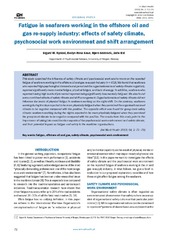Fatigue in seafarers working in the offshore oil and gas re-supply industry: effects of safety climate, psychosocial work environment and shift arrangement
Peer reviewed, Journal article
Published version

Åpne
Permanent lenke
https://hdl.handle.net/1956/12437Utgivelsesdato
2013Metadata
Vis full innførselSamlinger
Sammendrag
This study examined the influence of safety climate and psychosocial work environment on the reported fatigue of seafarers working in the offshore oil and gas re-supply industry (n = 402). We found that seafarers who reported high psychological demands and perceived the organisational-level safety climate negatively, reported significantly more mental fatigue, physical fatigue, and lack of energy. In addition, seafarers who reported having high levels of job control reported being significantly less mentally fatigued. We also found some combined effects of safety climate and shift arrangement. Organisational-level safety climate did not influence the levels of physical fatigue in seafarers working on the night shift. On the contrary, seafarers working during the days reported to be more physically fatigued when they perceived the organisational-level climate to be negative compared with the positive. The opposite effect was found for group-level safety climate: seafarers working during the nights reported to be more physically fatigued when they perceived the group-level climate to be negative compared with the positive. The results from this study point to the importance of taking into consideration aspects of the psychosocial work environment and safety climate, and their potential impact on fatigue and safety in the maritime organisations.
